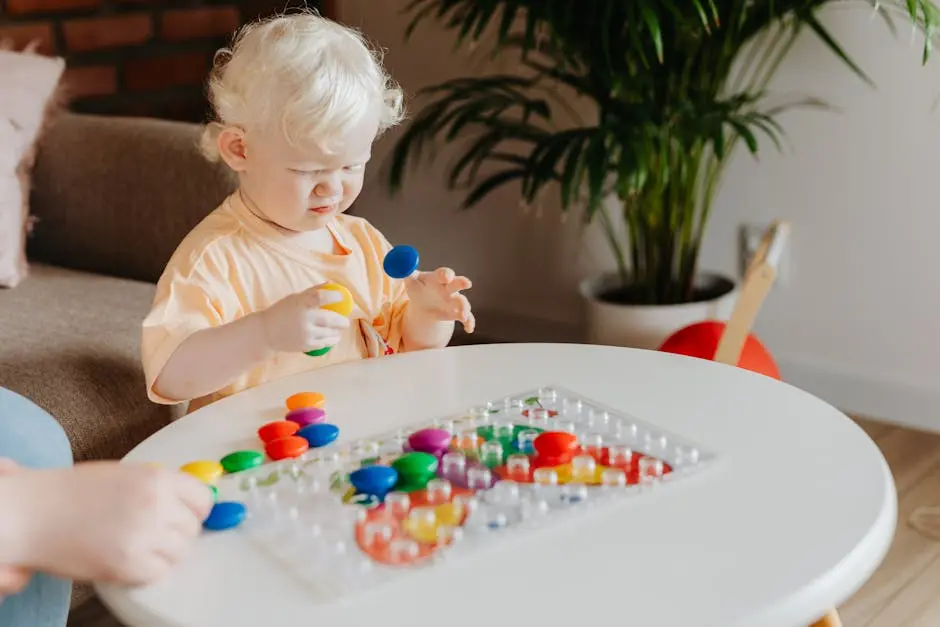Interactive toys are more than just playthings; they are vital tools for early childhood development. Understanding their role can help parents make informed choices about the toys they give their toddlers. In this blog, we’ll explore the various ways interactive toys promote development, from cognitive skills to social interactions, making them a must-have in every toddler’s playroom.
The Importance of Play in Early Childhood Development
Play is a fundamental aspect of childhood that unfolds the universe of learning for toddlers. Through play, toddlers explore their surroundings and develop essential skills. Engaging in play allows kids to grasp the world, teaching them about social interactions, cause and effect, and problem-solving. It’s during these innocent moments of joy that they learn how to communicate with others and understand emotions, both in themselves and their peers.
Moreover, play fuels creativity and imagination, which are crucial for a child’s cognitive development. When toddlers engage in pretend play, they set the stage for future learning opportunities. These imaginative scenarios often lead to questioning, experimenting, and reasoning, helping them build the foundational skills that will carry them through life. Ensuring that toddlers have access to varied and stimulating experiences through interactive toys can significantly enrich these moments of play.
What Are Interactive Toys?
Interactive toys are specially designed to encourage active participation from toddlers. Unlike traditional toys that simply sit back and wait for a child’s response, interactive toys engage toddlers through lights, sounds, and various tactile experiences. These playthings not only capture a child’s attention but also invite them to respond, making playtime a two-way street that promotes learning.
The beauty of interactive toys lies in their versatility; they can range from simple puzzles that require a toddler to match shapes, to more complex gadgets that respond to a child’s voice or actions. This interaction aids in enhancing their fine motor skills and cognitive thinking. When toddlers manipulate objects, they’re not just playing—they’re learning valuable skills that will support their development in areas such as communication and coordination.
It’s also worth noting that the interactivity can extend beyond individual play and into social play as well. Toys that involve teamwork or collaborative tasks encourage children to work together, sharing their experiences and learning from one another. This collaborative play nurtures social skills and strengthens emotional connections.
Cognitive Development Through Interactive Play
Cognitive development is at the forefront of what interactive toys offer. When toddlers engage with toys that challenge them to think, they enter a world of exploration and experimentation. For instance, a toy that requires problem-solving encourages toddlers to strategize, test their hypotheses, and adjust their approaches. These cognitive processes are vital for developing critical thinking skills.
Additionally, interactive toys often incorporate learning elements such as shapes, colors, and numbers. For example, a counting bear toy can help toddlers grasp basic counting skills while also enhancing their memory. By connecting play with educational elements, toddlers find learning to be a fun experience rather than a chore. This positive association sets the stage for a love of learning that can last a lifetime.
Furthermore, the immediate feedback that interactive toys provide reinforces learning. When a toddler pushes a button and hears a sound, they begin to understand cause and effect concepts. This instant response not only celebrates their achievements but also motivates them to keep exploring, thereby deepening their cognitive engagement.
Enhancing Motor Skills with the Right Toys
Motor skills development is another essential area in which interactive toys shine. These toys often require toddlers to use their hands, arms, and bodies in various ways, promoting both fine and gross motor skills. For instance, toys that involve stacking blocks or fitting shapes into corresponding slots engage the small muscles in their hands, laying a strong foundation for later tasks like writing.
Gross motor skills are equally important and are fostered through interactive toys that encourage movement, such as toy vehicles or ride-on toys. When toddlers push, pull, or climb, they enhance their coordination, balance, and overall physical fitness. This active engagement offers not just physical development but also promotes healthy habits early on, making active play a norm within their daily routines.
Moreover, as they manipulate toys, toddlers become adept at using their hands and fingers, which is crucial for their everyday tasks. The confidence they build through mastering these skills also translates into a sense of accomplishment, encouraging them to take on more challenging tasks in the future.
Fostering Emotional and Social Development
Emotional and social development goes hand-in-hand with the use of interactive toys. Through play, toddlers learn to manage their feelings, understand empathy, and navigate their relationships with others. Toys that include social elements, like puppets or role-play sets, allow children to explore different perspectives and communicate in a playful context.
When children engage with others using these toys, they practice sharing, taking turns, and resolving conflicts. These invaluable lessons teach toddlers about social norms and enhance their ability to express emotions appropriately. The more they engage in social play, the more equipped they become to build friendships and work within a group.
Additionally, many interactive toys are designed to promote cooperation. Games that require teamwork can strengthen emotional bonds by instilling a sense of camaraderie. As toddlers face challenges together, they learn about trust and support, paving the way for healthy relationships as they grow.
Choosing Safe and Age-Appropriate Interactive Toys
Selecting the right interactive toys is crucial for ensuring that toddlers benefit from playtime while staying safe. Parents should always look for toys that are labeled as age-appropriate, as these are designed with a child’s developmental stage in mind. Toys that are too advanced can lead to frustration, while those that are not challenging enough may not provide the stimulation toddlers need.
Moreover, safety should always be the top priority. Check for certifications and labels that indicate compliance with safety standards. Avoid toys with small parts that could pose a choking hazard, and ensure that materials used are non-toxic. The peace of mind that comes from knowing that a child is playing with safe toys enhances the joy of these learning experiences.
It’s also beneficial for parents to actively participate in the selection process. By observing how toddlers engage with different toys, parents can gain insight into what sparks their child’s interest. This involvement not only makes shopping for toys an interactive experience but also deepens the parent-child relationship, as they share in the joy of exploration and discovery.
Conclusion: Making the Right Choice for Your Toddler
In conclusion, making thoughtful choices when it comes to interactive toys can greatly impact a toddler’s developmental journey. These toys introduce countless opportunities for learning, exploration, and growth. Whether it’s enhancing cognitive abilities, developing motor skills, or fostering emotional connections, the right interactive toys serve as essential tools in a child’s early years.
As parents navigate the sea of toy options, it’s important to remember the broader picture of how play influences a child’s life. By selecting toys that are engaging, educational, and safe, parents not only enrich their children’s playtime experiences but also lay down the foundation for lifelong learning. The enriched playtime that interactive toys provide should not be underestimated, as it represents a unique blend of fun and learning.
Ultimately, investing in interactive toys creates an environment where toddlers are empowered to explore their potential, express themselves, and develop skills they will carry into adulthood. These toys are more than mere entertainment; they are gateways to innovative learning pathways and a joyful growth journey.
Final Thoughts
In conclusion, interactive toys for toddlers play an essential role in nurturing a child’s development. They not only entertain but also stimulate cognitive skills, enhance motor abilities, and foster emotional growth. By choosing the right interactive toys, parents can ensure their toddlers are benefiting from playtime in meaningful ways.



Dejar un comentario
Este sitio está protegido por hCaptcha y se aplican la Política de privacidad de hCaptcha y los Términos del servicio.